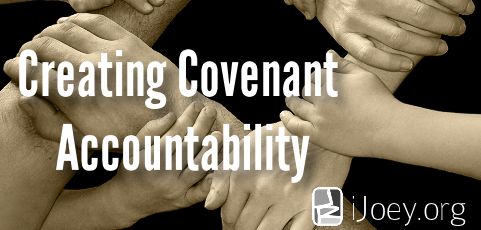The hardest thing about creating covenant accountability is the decision to be accountable in the first place.
This year, I’ve renewed my participation in a covenant discipleship group. I also continue to be in covenant with a group of leaders here at the church. My pastor, Dr. Richard Clark, is participating in covenant with my Bishop, Bill McAllily. In the next few weeks, the SPRC and I will hammer out our covenant for work together as Grace enters a new phase of missional outreach and discipleship building.
For our efforts, there are several methods to approach, but all of them involve conversation. And that is where the logjam occurs. There are simply not enough of us talking about what it means to “do life together.”John Wesley famously asked questions in his covenant groups. The three that are best known to most of the folks I know are as follows:
- How is it with your soul?
- What effort shall we inquire about on the occasion of our next meeting?
- How can I pray for you?
I use these to guide my conversations with church leaders at Grace. I use these in staff conversations. And I recommend them to you as a basis for beginning your covenant.
How Is It With Your Soul?
The first time I asked a friend this question, the answer was simple: “It’s great.” I pressed a bit.
“You do realize that your soul is the combination of your body, your mind, and your spirit or emotions, right?” I asked.
He replied, “Oh, I thought you were inquiring after the state of my salvation!”
In reality, this question plumbs the depths of a person’s well-being. It’s more than a “how do you do?” We ask after one another’s physical health and mental health and emotional health when we ask after the state of one’s soul. In the work I do with the Board of Ordained Ministry, we put candidates to the test in all three areas. This can sometimes result in feeling overwhelmed and even violated. When those things occur, we have failed to ask good questions. The point of a test is success as opposed to the point of temptation, which is failure.
Physical Health
I’m currently pursuing a regimen of healthy eating and exercise. I’m not on a diet. Technically, I am on a diet. The term means, “the the kinds of food that a person, animal, or community habitually eats.”
What I’m doing is important, but I’m not here to bore you with details. What I can tell you is that there are five other people who are holding me in accountability just for sticking to my regimen. They ask how it is going. They ask if I’m exercising, what I’ve eaten lately, and offer tips that have worked for them.
I also mention this to my covenant group, which takes on a broader responsibility, but does ask after my health in general. And I mention this to the advisory council when we meet. As the Staff Parish Relations Team and I work out our covenant, they will ask after my lifestyle choices once a month.
The simple question that comes up most often is, “Why?” The simple answer is “Because I want them to ask me.”
My motivation is the fact that I have to ask prospective pastors if they are maintaining their health with good choices and exercise. How can I possibly do that if I am not practicing those same disciplines?
Mental Health
My mind has frequently been the butt of the odd joke here and there. I’m one who sees solutions without navigating the steps to that solution, so I’ve been far enough ahead, at times, to be thought a fool. I’m also one who gets bogged down in the steps, easily distracted, so I’ve been far enough behind, at times, to be thought a simpleton. But the real problem with my mental health has to do with the amount of work I find myself wrestling.
I love a challenge. And I love my church. I love Jesus. So when I’m sent to a church that is facing a challenge and asked to lead it in the ways of the Kingdom of Christ, I dive right in. When I’m asked to help out with a challenge facing our United Methodist Church, I tend to do the same. And when the Church is facing as many issues and challenges as we face today, I often say yes to far too many challenges and opportunities.
So I ask my covenant group to help me monitor my commitments. They are given full permissions to call me on the carpet. And with my schedule, I’ve been hearing about it lately. In response, I’ve turned down several new opportunities and focused in on the current tasks with the hope that I would be able to finish those projects in a timely fashion — both to free myself for new opportunities and to reduce my workload to a more manageable state.
Emotional Health
In matters of the spirit, there are plenty of things that weigh heavily on a pastor’s spirit. One doesn’t have to go far to find studies and papers that describe the difficulties faced by pastors. It is vital that I am taking care of these matters just like any other disciple of Jesus Christ. I am relying heavily upon prayer and meditation along with the practice of spiritual disciplines like fasting and service.
There are times when I have felt the need to speak to a counselor. The rule of thumb in pastoral care is, “Every counselor needs a counselor.” The same rule holds true for those who are caring for the emotional health of others.
About What Effort Shall We Inquire?
This question is often oversimplified to describe the “latest big issue I’m tackling.” While that is certainly a part of this question, I think we do ourselves injustice when we neglect to consider the practices of our faith. To what spiritual discipline are you giving extra effort?
In different seasons of my life, different disciplines have become more important than others. For example, in days when I’ve been more selfish than I ought to have been, I’ve found that fasting was crucial to my spiritual and mental health. When my strength flags and fails, prayer is my best tool for renewing my reserves and refocusing on God.
Our covenant partners can help us to focus our effort on the most important aspect of our life. Sometimes, it is enough to merely mention these aloud. In doing so, we name our intention and impress it up on our own mind. With the knowledge that others are thinking about it as well, we can proceed with confidence and shared strength.
How Shall We Pray for You?
This is one of the most powerful and yet one of the weakest areas of discipleship for many Christians. It is most powerful because of the sheer strength and energy that may be brought to bear by the simple act of prayer. It is the weakest because so many of us tend to give it lip service in a vain effort to appear pious. How often have we said, “I’ll be praying for you,” and left that matter unattended?
Hearing the requests of others requires that we pray diligently for them. The result of failing in this area is that we don’t share our deepest needs when asked. I’ve noted that the transaction is not worth it: You get to hear my deepest pain without putting anything on the table yourself. Now, that’s pretty cynical until I offer myself in confession and admit that there have been times when I’ve said those words and done nothing about it.
Praying diligently for one another is key to any covenant. Not only does it unleash power from God, it draws our attention away from ourselves and focuses it upon the other. In this fashion, we practice agape love.
Creating Your Own Covenant
I’ve helped many people find a covenant group. I’ve offered counsel to those who were creating a covenant group. I’ve started three or four myself. In all those efforts, I’ve never found a more Wesleyan model than that described by Dr. David Lowes-Watson. At the United Methodist website, you can find materials to help you form your own group. You might wish to ask your pastor to help out.
Here on iJoey.org, there are materials designed to help you lead that process as well. They require a basic familiarity with the concept, but otherwise do a fair job of walking a number of people through the process at once.
A Wesleyan Model for Covenant Discipleship
How do you experience covenant?
What questions and methods do you use?
Share your thoughts in the comments section below.
















Recent Comments